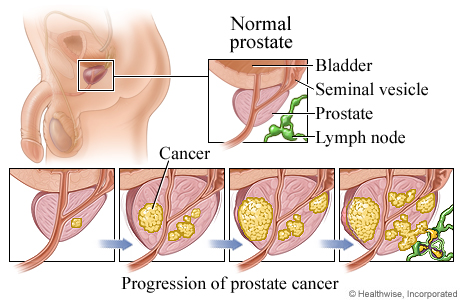Treatment Overview
Treatment for prostate cancer is based on the stagestage of the cancer, your Gleason scoreGleason score, and other things, such as your age and overall health. The main options are active surveillance, radiation therapy, and surgery to remove the prostate. Hormone therapy is sometimes given along with radiation therapy or surgery. Other treatments may be used, such as chemotherapy and immunotherapy.
Your doctor will talk with you about your options and then make a treatment plan. Some people choose watchful waiting instead of treatment.
Some people use complementary therapiescomplementary therapies along with traditional medical treatment. These therapies may help you cope with the symptoms and stress of cancer. For example, acupuncture may help reduce hot flashes caused by hormone therapy. Talk with your doctor about any of these options you would like to try.
Active surveillance
This may be an option if the cancer is slow-growing and confined to the prostate (localized). With active surveillance, you'll have regular checkups and tests, but you won't have treatment unless the cancer grows.
Treatments such as surgery or radiation can cause serious side effects. Active surveillance lets you avoid or postpone treatment and its side effects. Some people who have very slow-growing localized prostate cancer may never need treatment. Others can delay treatment until tests show that the cancer is growing more quickly.
If you choose this option, it's very important to follow your doctor's schedule of tests and exams. This increases the chance of finding out right away if the cancer starts growing. Then it can be treated in the early stages, when treatment is most successful.
Even if the cancer isn't growing, you can choose to start treatment at any time.
Radiation therapy
Radiation therapy uses high-dose X-rays to destroy cancer cells and shrink tumors. Radiation for prostate cancer is usually given by a machine outside the body (external radiation). It may also be given by placing substances inside the body (internal radiation, or brachytherapy).
Radiation therapy may be used alone to treat prostate cancer. Or it may be combined with hormone therapy if tests show that the cancer is likely to grow. Radiation is sometimes used after surgery to destroy any remaining cancer cells.
Surgery
Surgery to remove the prostate is called radical prostatectomy. This is most often done if tests show the cancer hasn't spread outside the prostate (localized cancer). A doctor removes the whole prostate and the seminal vesiclesseminal vesicles. The doctor also removes any nearby tissue that may contain cancer. This may be done as:
- Laparoscopic surgery.
- This is done through several very small cuts in the belly. The doctor uses a tiny camera and special tools. Most doctors do it by guiding robotic arms that hold the surgery tools. This is called robot-assisted prostatectomy.
- Open surgery.
- The doctor may do surgery through one cut (incision) in the belly. This is called the retropubic approach. Or it may be done through an incision between the anus and the scrotum (perineum). This is called the perineal approach.
If possible, the doctor will try to save the nerves that are needed for an erection. This can only be done when there is no chance of leaving cancer cells behind.
The doctor may also remove lymph nodeslymph nodes in the pelvic area to check them for cancer. This is called pelvic lymph node dissection.
Hormone therapy
Prostate cancer needs male sex hormones (androgensandrogens) to grow. Hormone therapy lowers the level of androgens in your body. This can slow the growth of prostate cancer and even shrink the tumors. This may also be called androgen deprivation therapy (ADT).
The main androgen is testosterone. It is mostly made by the testicles. Hormone therapy may be done with:
- Medicines.
- Hormone therapy is often done with medicines that block testosterone. These may be given as shots or pills.
- Surgery.
- Surgery may be done to remove the testicles (bilateral orchiectomy). This lowers the testosterone level right away.
Other treatments
Other treatments may be used, especially if prostate cancer has come back after treatment (recurrent cancer) or has spread to other parts of the body (metastatic cancer). Examples include:
- Chemotherapy.
- These medicines kill fast-growing cells, including cancer cells and some normal cells.
- Cryosurgery.
- This treatment uses extreme cold to destroy cancer cells.
- Immunotherapy.
- This treatment helps your immune system fight cancer. It may be given in several ways.
- Targeted therapy.
- These medicines target cancer cells and may cause less harm to normal cells. They help keep cancer from growing or spreading.
- High-intensity focused ultrasound (HIFU).
- This treatment uses sound waves to create heat that destroys cancer cells.
Watchful waiting
Watchful waiting is a wait-and-see approach to treatment that may be an option for certain people. You would have regular visits with your doctor but fewer tests than with active surveillance. The focus is on treating any symptoms that bother you rather than trying to cure the cancer. This may be a good choice if you are too ill to have (or don't want to have) aggressive treatment, such as surgery.
As with active surveillance, you can change your mind and start treatment at any time.
Learn more
- Active Surveillance for Prostate CancerActive Surveillance for Prostate Cancer
- Cryosurgery for Prostate CancerCryosurgery for Prostate Cancer
- Hormone Therapy for Prostate Cancer (Androgen Deprivation Therapy, or ADT)Hormone Therapy for Prostate Cancer (Androgen Deprivation Therapy, or ADT)
- Immunotherapy for CancerImmunotherapy for Cancer
- Prostate Cancer: Should I Choose Active Surveillance?Prostate Cancer: Should I Choose Active Surveillance?
- Prostate Cancer: Should I Have Radiation or Surgery for Localized Prostate Cancer?Prostate Cancer: Should I Have Radiation or Surgery for Localized Prostate Cancer?
- Radiation Therapy for Prostate CancerRadiation Therapy for Prostate Cancer
- Radical ProstatectomyRadical Prostatectomy




